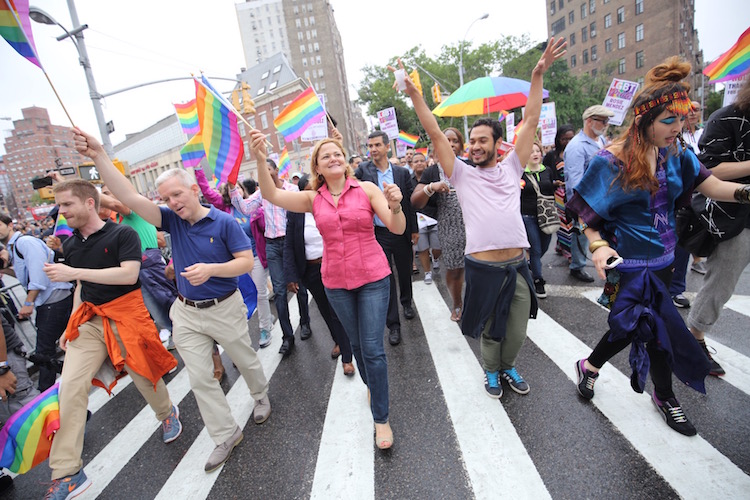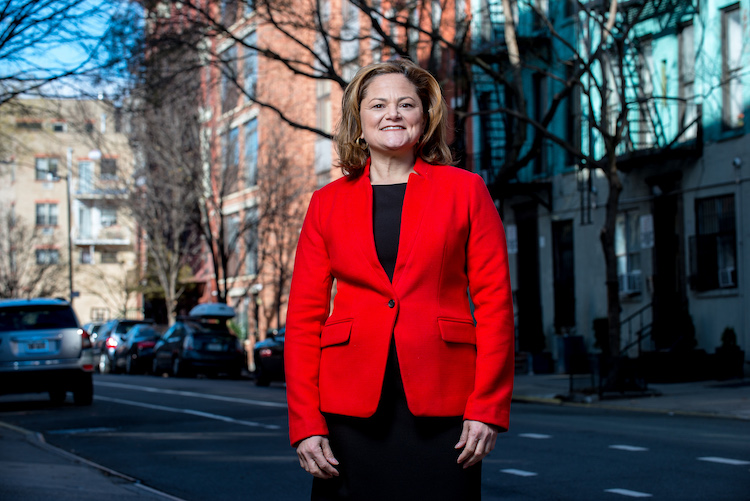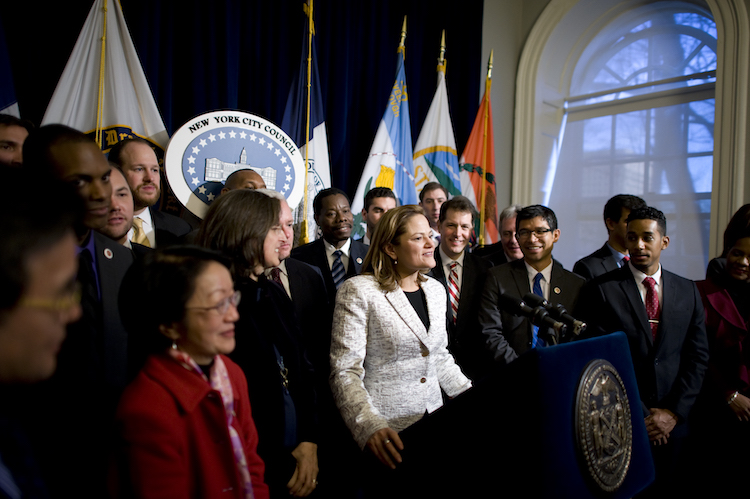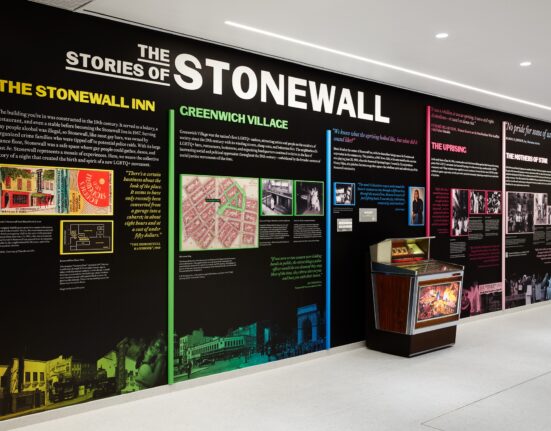First Public Advocate Candidate to File Petition Signatures, Transporting Her to the Top of the Ballot 
Former New York City Council Speaker Melissa Mark-Viverito was the first candidate to file petition signatures allowing her on the ballot for the position of Public Advocate. Securing her position on the “top of the ballot” could possibly get her some extra voter attention. Running on the platform “Fix the MTA,” Mark-Viverito is a candidate worthy of voter attention.
Born in San Juan, Puerto Rico, the liberal democrat moved to New York to attend Columbia University. She received her master of public administration degree from Baruch College. In 2005 she was elected to the office of the City Council in District 8, during which time she passed legislature regarding tenant harassment, building safety and green buildings. In 2014 she was elected Speaker of the City Council, the second-most powerful political post in New York City.
As City Council Speaker she introduced a collection of eight bills known as the “Criminal Justice Reform Act,” which reduced the penalties of violating park rules, littering and public urination from misdemeanors to a civil process. She is currently fighting to improve the subway system and public housing. She has worked with the LGBTQ community in schools, in businesses and regarding the homeless situation among gay youth. Her endeavors to help the people of NYC are endless. She is a strong woman and often achieves what she steps out to do.
Mark-Viverito wishes for the public to get to know her as a person. I spoke with her regarding her political views, what she hopes to accomplish and what she has already cultivated in New York City. She is the first political candidate interview that Get Out! magazine has done, and was chosen with good reason.

What exactly does a Public Advocate do?
Pretty much what the name says. It’s an independent watchdog at a city-wide level that makes sure that the government agencies are being responsive to the needs of the constituencies in New York City. When there are issues of concern with regard to the Mayor and the administration, we look at them and see what solutions we can provide. So really the position has a direct relationship with the constituency of New York. I would be responsible to the needs that the constituents are expressing. It’s about making sure the government is more responsive and effective for all New Yorkers.
What made you decide to run for this office?
The reality is that we had the vacancy, and so many people didn’t expect to have this. We had that unfortunate situation with Attorney General Schneiderman, and our Public Advocate Tish James became interested in running for that seat. I served with her—she’s a friend, a colleague—and when I understood that she was serious about running, and I knew that she had a really good chance of winning, I started to think, “What happens when her position becomes vacant?” We don’t have any women in a city-wide leadership position in New York. We see a dwindling of women running for office in the City Council. We have less women in the City Council than we did when I came in. I started thinking as a woman and as a constituent of New York, we had to have a woman in that seat. That’s when I started having consultations with my advisers and people that I trust. I have a track record of success, and I decided to run based on the fact there would be a woman in a city-wide office, in a city that has a majority of people of color; otherwise it would be three white men that would be leading the city of New York. So that really had me revisit commitments that I made to public service, and I wanted to be able to serve in this capacity and to continue to voice the concerns of New Yorkers and to be able to make sure the government was most responsive to their needs.

As a political person, do you have a desire to perhaps run for mayor or governor or even president in the future?
No. I mean, look, nobody thought this seat would be vacant. I had no interest in running for Public Advocate. It was not in my sights. I was in private life doing the work that I was doing. Now my focus is completely on this position. There is just a tight window, and I don’t have time to think of anything else. I am committed to serving the term of Public Advocate and being the best Public Advocate that I can be. I only have until February 26 to raise money. I don’t have time to think about what is happening five or six or eight years from now. I want to serve, I want to be a voice for New Yorkers, I want to make sure the government is responsive, and that’s what public service has always been to me. That’s why I decided to enter, so that I could work again on behalf of every New Yorker. We have to be able to accommodate diverse interests and diverse needs. That’s what government is geared to do, and I have a track record of having done that as City Council Speaker. Now, this is a monitoring, kind of watchdog position, where we can ensure that the commitments that we have made to New Yorkers are being fulfilled. We have laws that we have implemented that are not necessarily being fulfilled in the way that they are meant. We have to make sure that the government will be responsive to what we committed to. As Public Advocate, I can be a watchdog and make sure that the commitment government made to the people is being fulfilled.
What is your focus on the LGBTQ community?
We laid out a platform of about 10 things that I would advocate for the LGBT community. There was a lot that I have done as a Councilmember and a Speaker to demonstrate my commitment. I am an unapologetic progressive whose approach to government, and my whole approach to life, is that we have to be inclusive and accepting and responsive to everybody. The same rights that I want for myself, I want for everybody else. I am a really strong ally of the LGBT community. For example, the municipal ID for New York allows for people to self-identify when it comes to gender. That was really important, to make sure that the municipal ID that represents our city demonstrated that we are a city that belongs to everybody by allowing people to have an ID that truly represents them. Under my Speakership, we also did legislation on gender-equal bathrooms. I’ve also extended opportunities for LGBT seniors, making sure that we provide more services to that community [and] extended beds for homeless youth—we know a large percentage of those youths are LGBTQ. We allocated funding to make sure we had a dedicated staff member at the Department of Education to serve as an LGBTQ liaison. That has been extremely powerful to have a person assigned to make sure that young people, students, that identify as LGBTQ had a welcoming environment to be educated. That really helps. We thought about expanding on that concept onto other city agencies as well. I’m hoping to present that in a platform. It’s a great model to take to other cities as well. I made a recommendation in support of LGBTQ entrepreneurs in businesses, supporting an order that prohibits groups that discriminate against the community, and for more funding for HIV testing and support services for homeless LGBT youths.
This is the one of the first, if not the first, political articles that Get Out! magazine has endeavored to do; it’s an entertainment magazine.
Really?
Yes, it’s a weekly print magazine recently named the #7 LGBTQ magazine blog on the planet by Feedspot, so you had to be a strong candidate for my publisher to consider your interview.
That really does mean a lot. I did not know that.
So the thing is, as an entertainment journalist, is there anything else that I should be asking you, or that you wish to talk about?
I think that just capturing the essence of who I am as a person and how that transfers over to whom we want to elect.
My role in government has always been, how do we ensure protection and send a message out with our policies and our laws that demonstrate that New York belongs to all of us. We are not going to tolerate abuse or any political discrimination or bias or hatred towards our brothers and sisters, whatever your religion, whatever you are.
I just want people to get to know me as a person and know that this is a part of my essence and my core values, and that having an elected official in any position that possesses these values is in the best interest of any New Yorker, because I’m going to fight for everybody in the same way. I’ve demonstrated that with my immigration reform, I’ve showed that to my LGBT allies and everybody else, whether they are Muslim or Jewish or whatever. I am unapologetic, I speak out and make sure that our city government continues to uphold those values as well. That’s why I’ve decided to run, and I think my trajectory is very clear about what my position is. That’s why I work so much with the LGBT community, despite the fact that I’m not gay—the fact that I believe in these issues at my core, people know that I’m going to be a fighter. That’s someone you need to see in a position like this; you need a fighter and someone progressive.
What made you so aware of human rights and so willing to stand up for them?
It really does stem from my upbringing. My mother was a young mother. I was raised in the early ‘70s during the feminist movement in Puerto Rico. I was raised in an environment of strong women, very vocal women, women that would fight for their rights as women. Within that struggle there were lesbian women that would fight for that movement, for gay rights during that time. For Puerto Rico, that was a very difficult and challenging time. So I was always raised in an environment of inclusion and acceptance. My mother had values that we loved everybody regardless of who they are or what they looked like. So that was probably the beginning, the way I was raised. That always stuck with me. I am also a survivor of sexual abuse. I don’t see myself as a victim, but the idea of being a fighter and demanding respect, and to have my voice heard, is something that I’ve gotten from my personal experiences. It’s part of who I am. I’ve been very hopeful, very outspoken, and I carried it over when I came to New York. What I want for myself, I want for everybody else. I can’t demand respect for me as a woman if I’m not going to give that respect back. That carries on to everything that I do.

